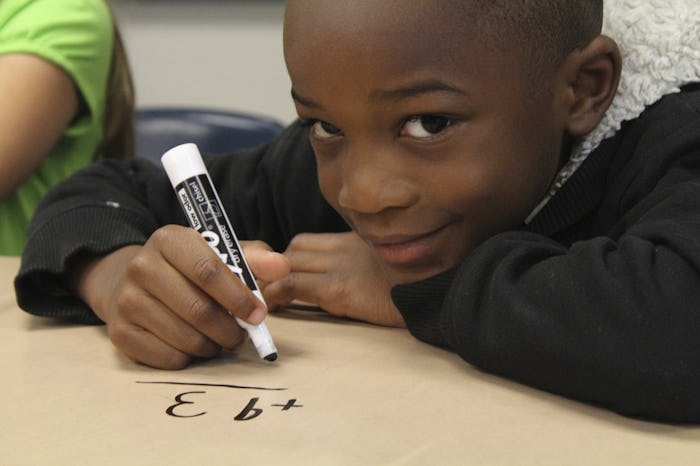Life

How To Build A Good Relationship With Your Kid's Teacher
I've worked for nearly a decade in education, primarily with children who have developmental delays or gifted abilities, and I've discovered some fundamental truths along the way. After one particularly rough day I learned to always bring hand sanitizer with me. I've also found that there's no such thing as a "bad kid." Yet, perhaps the most important thing I've learned is that children thrive when everyone — teachers, family, tutors, etc. — support them. So if you're looking for ways to help your child blossom in school, you might be wondering how to build a good relationship with your kid's teacher.
There is some solid truth to the old adage that it takes a village to raise a child. If you're anything like me, you want your child to know they have an entire team rooting for, supporting, and encouraging them. So having a good relationship with the educators in your child's life strengthens the network of healthy, productive communication.
Additional perks of having a great relationship with your kid's teacher is that you can stay on top of things more easily, you'll always be "in the loop," and you and your child will be less hesitant to voice concerns if an issue ever arises. So if you'd like to know how to build a relationship with your child's teacher, then check out these simple tips.
1Talk To Them In Person
This might sound silly or even painfully obvious, but you'd be surprised how many parents I've met that couldn't pick their kid's teacher out of a lineup. Kristen L. Hodnett, a clinical professor in the department of special education at Hunter College, told Understood that meeting with your child's is key to building a good partnership. It also helps you get to know one another and for you to let them know any special details about your child that they wouldn't know otherwise.
2Discuss Availability
Your child's teacher is obviously busy during school hours and your schedule may overlap or conflict with their's, so discussing availability is always a good idea. According to The U.S. Department of Education one way to develop a good relationship is to, "make sure your child’s teacher has multiple ways and times of day to contact you." That way you'll never have to worry about missed opportunities.
3Verbalize Your Intention
Teachers meet many different people in a school year and so you want to make sure you stick out in their memory. Elena Aguilar, a leadership coach and former teacher, told Edutopia, "tell them that you want to partner with them, that you appreciate their support, and look forward to working together." Make your intentions clear so everyone is on the same page about your child's education experience.
4Remember It's A Two-Way Street
The responsibility to solve problems doesn't solely fall on your child's teacher. It's helpful if both you and the teacher maintain a good back-and-forth way of communicating. According to The American Federation of Teachers, "parents and teachers should have the information they need to help students, in a form and language that makes sense to them." That's why it's always a good idea to clarify things so you both know what you mean.
5Get Your Child Involved
Remember that the purpose of building a good relationship with your child's teacher begins with your child. The experts at Baby Center suggested that children are more likely to answer specific questions about school, which you can use when talking with the teacher. Having everyone involved in the communication process is key.
6Be Generous With Compliments
Having worked in the education system, I can tell you that the majority of conversations started by parents began on a negative note. That's not to say you should never voice concerns, but a little bit of positivity goes a long way. According to Parenting, a great way to build a good relationship with your child's teacher is to give positive feedback about your child's progression. After all, everyone loves a little praise from time to time.
7Don't Get Defensive
Most every parent, myself included, believes their child is a perfect angel. This can make things awkward when your child's teacher sees differently. Nancy Byron, an elementary teacher, told The Orange County Register that parents should "be open to the possibility that their child may have an area of weakness and work in partnership with the teacher to help their child." Acknowledging your child might have an area they need to work on is the first step to improving the situation.
8Step Into Their Environment
Whether you choose to volunteer or just visit, walking a mile in your child's teacher's shoes can do wonders for understanding and growing your relationship. Scholastic has suggested parents set up a time to observe classroom activities or even arrange a monthly schedule to reinforce consistency.
9Try Not To Project
If you didn't exactly have the best experience with teachers growing up, it can be difficult to approach current situations without bias. Dr. Michael Thompson told PBS, "it’s important to leave your own baggage at the door, so you can talk about your child with the teacher—and not about you." Though it's always valid to address any concerns you have, try not to let your past negatively color your present.